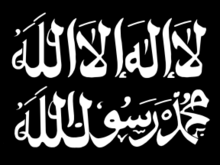Fatah al-Islam
Fatah al-Islam ( Arabic فتح الإسلام, DMG Fatḥ al-Islām ) is a Sunni, radical Islamic underground organization that operates from the Nahr al-Bared refugee camp near Tripoli in Lebanon . In November 2006 it split from the pro-Syrian Fatah al-Intifada , which in turn split from Fatah in 1983 . It is said to be close to al-Qaeda . The Lebanese government puts the group under contact with the Syrian secret service , which Fatah al-Islam denies. It is estimated that the group consists of 150 to 200 fighters, including veterans from Iraq .
The group is involved in fighting and attacks against President Assad in Syria .
guide
Fatah al-Islam was founded and led by Shakir al-Absi , who last lived († uncertainly) in Lebanon. From 2000, Al-Absi spent three years in a prison in Syria for smuggling arms and ammunition. He was a supporter of Abu Musab al- Zarqawi , the former leader of al-Qaeda in Iraq. He was sentenced to death in absentia by a military tribunal in Jordan in 2004 for his involvement in the assassination attempt on US diplomat Laurence Foley . The official spokesman for the group is Abu Salim.
aims
According to al-Absis, one of the group's goals is to rule the Palestinian refugee camps according to Sharia law . Other goals are the fight against Israel and the United States . The organization also threatened attacks against soldiers of the UNIFIL protection force in southern Lebanon.
financing
According to the AKUF office of the University of Hamburg , Fatah al-Islam received most of its financial resources from Saudi Arabia .
history
In December 2006 it became known that a senior UN official had been informed by the representative of the PLO in Lebanon, Abbas Zaki , of a plot by Fatah al-Islam to liquidate 36 anti-Syrian persons in Lebanon.
According to the Lebanese government, four Syrian members of Fatah al-Islam confessed to having carried out two bomb attacks on buses on February 13, 2007 in the predominantly Christian town of Ain-Alaq near Beirut . Al-Absi, however, denied that his organization was involved in the attacks, as it did not intend to strike within Lebanon.
On May 20, 2007, fighting broke out in the Palestinian refugee camp Nahr al-Bared between members of the militant Palestinian organization and the Lebanese army as they were chasing bank robbers . The Lebanese army has been banned from entering the Palestinian refugee camps since 1968. The fighting continued until September 2nd. More than 130 Fatah al-Islam fighters, 157 Lebanese soldiers and 42 civilians died. Among the Fatah al-Islam fighters killed was probably Fatah al-Islam number one Shakir al-Absi, number four Saddam al-Hajdib , who was one of the people behind the attempted bombings on two German regional railways in July 2006 and Abu Yazan, the third man in the leadership of the militant organization.
American investigative journalist Seymour Hersh alleged that the Lebanese government initially supported the group because it believed that such support would weaken Hezbollah . After Hersh, the United States government is also said to have used Fatah al-Islam to counter the growing influence of the Shia in Lebanon, but that "this policy has bitten [the US] in the butt" . Hersh's allegations contradict the Lebanese government's allegations that Fatah al-Islam is controlled by the Syrian government.
The Spanish government accuses Fatah al-Islam of carrying out a bomb attack on Spanish UNIFIL soldiers on June 24, 2007, in which six soldiers were killed. Fatah al-Islam had previously threatened attacks against the UNIFIL soldiers, claiming that they intervened in the battle for Nahr al-Bared, which UNILFIL denies.
On April 20, 2012, one of its leaders, chief bomb maker Abdel Ghani Jawhar, was killed in Syria. He accidentally blew himself up.
Web links
- Yassin Musharbash: Attrition Battle Against New Jihadist Troop. Spiegel Online, May 21, 2007
- Tine Gade: Fatah al-Islam in Lebanon: Between global and local jihad. Norwegian Defense Research Establishment (FFI), December 5, 2007
Individual evidence
- ↑ a b c d BBC News : "Profile: Fatah al-Islam" , May 21, 2007 (English)
- ↑ a b Lebanon’s Most Wanted Sunni Terrorist Blows Himself Up in Syria TIME Magazine on April 23, 2012.
- ↑ Bassem Mroue: “Dozens killed in Lebanon gunbattle between Islamic militants, security forces” , AP / ABC News , May 22, 2007
- ↑ Ayman El-Masry: "Fatah Al-Islam Explained" ( Memento of the original from September 21, 2007 in the Internet Archive ) Info: The archive link was inserted automatically and has not yet been checked. Please check the original and archive link according to the instructions and then remove this notice. , The Journal of Turkish Weekly , May 23, 2007, accessed May 26, 2007
- ↑ Al-Jazeera: Lebanon blast kills Unifil troops , June 24, 2007
- ↑ AKUF at the University of Hamburg: 327 Lebanon ( Memento from December 8, 2010 in the Internet Archive )
- ↑ Reuters : "Annan urges Lebanon talks in hope of ending crisis" , December 7, 2006
- ↑ Souad Mekhennet and Michael Moss: A new face of Al Qaeda emerges in Lebanon , International Herald Tribune , page 2/4 (English), March 15, 2007
- ↑ a b Al-Jazeera : Lebanese PM declares victory , September 2, 2007
- ^ Spiegel Online : Brother of the suitcase bomb suspect killed in Lebanon , May 21, 2007
- ↑ Naharnet : Fatah al-Islam Militants Entrenched Behind Human Shield in Nahr el-Bared's fighting , May 21, 2007
- ↑ Turkish Daily News : Fatah a l-Islam had support from US, claims Hersh ( Memento of the original of September 30, 2007 in the Internet Archive ) Info: The archive link was automatically inserted and not yet checked. Please check the original and archive link according to the instructions and then remove this notice. , May 24, 2007
- ↑ Der Spiegel : Spain blames Fatah al-Islam for attack , June 25, 2007
